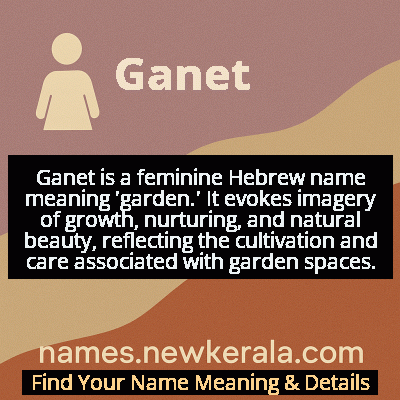Ganet Name Meaning & Details
Origin, Popularity, Numerology Analysis & Name Meaning of Ganet
Discover the origin, meaning, and cultural significance of the name GANET. Delve into its historical roots and explore the lasting impact it has had on communities and traditions.
Name
Ganet
Gender
Female
Origin
Hebrew
Lucky Number
2
Meaning of the Name - Ganet
Ganet is a feminine Hebrew name meaning 'garden.' It evokes imagery of growth, nurturing, and natural beauty, reflecting the cultivation and care associated with garden spaces.
Ganet - Complete Numerology Analysis
Your Numerology Number
Based on Pythagorean Numerology System
Ruling Planet
Moon
Positive Nature
Diplomatic, friendly, artistic, empathetic.
Negative Traits
Over-sensitive, moody, indecisive, prone to self-pity.
Lucky Colours
Green, cream, white.
Lucky Days
Monday.
Lucky Stones
Pearl, moonstone.
Harmony Numbers
1, 3, 4.
Best Suited Professions
Diplomats, mediators, caregivers, artists.
What People Like About You
Cooperative spirit, friendliness, artistic talent.
Famous People Named Ganet
Ganet Sadeh
Israeli botanist and environmentalist
Pioneered sustainable agricultural practices in arid regions and established community gardens across Israel
Ganet Cohen
Jewish educator and author
Developed innovative Hebrew language curricula used in diaspora communities worldwide
Ganet Levi
Community organizer
Founded urban gardening initiatives in Jerusalem that transformed neglected spaces into community green areas
Name Variations & International Equivalents
Click on blue names to explore their detailed meanings. Gray names with will be available soon.
Cultural & Historical Significance
In modern Israeli culture, the name connects to the Zionist ideal of making the desert bloom and the agricultural revival that characterized early settlement in Palestine. The name embodies the Jewish people's relationship with the land of Israel and the values of cultivation, preservation, and growth that have been central to Jewish identity across generations. The agricultural metaphors in Jewish texts and the importance of land in Jewish history give Ganet additional layers of cultural resonance beyond its literal meaning.
Extended Personality Analysis
Women named Ganet typically exhibit nurturing and growth-oriented personalities, much like the gardens their name represents. They tend to be patient cultivators of relationships and projects, demonstrating care and attention to detail in all they undertake. Their grounded nature makes them excellent listeners and supportive friends who create safe spaces for others to grow and flourish. Ganets often possess a quiet strength and resilience, able to weather challenges while maintaining their core values and compassion.
These individuals are typically creative problem-solvers who approach difficulties with practical wisdom and a long-term perspective. Their connection to nature often manifests in environmental awareness, artistic expression, or healing professions where they can help others blossom. While they may appear reserved initially, Ganets reveal deep wells of emotional intelligence and intuitive understanding that make them valued members of any community. They tend to be observant and reflective, preferring meaningful connections over superficial interactions, and they often serve as stabilizing influences in their social and professional circles.
Modern Usage & Popularity
In contemporary times, Ganet remains a relatively uncommon but meaningful choice among Hebrew-speaking communities and those seeking names with natural and spiritual significance. The name has seen modest growth in popularity as parents increasingly look for names connected to nature and environmental consciousness. While not among the top names in Israel or Jewish communities worldwide, it maintains a steady presence, particularly among families with strong connections to gardening, environmental activism, or those seeking names that reflect Jewish agricultural heritage. The name appeals to modern parents who value uniqueness without being overly exotic, and its gentle sound and positive associations make it accessible across cultures. Recent years have shown a slight uptick in usage as eco-conscious naming trends gain momentum, though it remains a distinctive choice that stands apart from more common nature-inspired names.
Symbolic & Spiritual Meanings
Symbolically, Ganet represents cultivation, growth, and the nurturing of potential in all forms. The garden metaphor extends to personal development, relationships, and community building—suggesting that like a well-tended garden, life requires patience, care, and the right conditions to flourish. The name carries connotations of sanctuary and refuge, evoking the image of a protected space where beauty and life can thrive away from harsh external elements. It symbolizes the intersection of human effort and natural processes, representing the idea that we are both cultivators and part of the cultivation. The cyclical nature of gardens—seasons, growth, harvest, and renewal—also connects Ganet to themes of resilience, continuity, and the enduring power of life to regenerate and transform, making it a name rich with metaphorical significance about the human experience.

